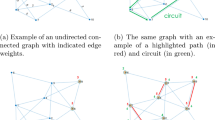Abstract
In this work we present a new approach to tackle the problem of Post Enrolment Course Timetabling as specified for the International Timetabling Competition 2007 (ITC2007), competition track 2. The heuristic procedure is based on Ant Colony Optimization (ACO) where artificial ants successively construct solutions based on pheromones (stigmergy) and local information. The key feature of our algorithm is the use of two distinct but simplified pheromone matrices in order to improve convergence but still provide enough flexibility for effectively guiding the solution construction process. We show that by parallelizing the algorithm we can improve the solution quality significantly. We applied our algorithm to the instances used for the ITC2007. The results document that our approach is among the leading algorithms for this problem; in all cases the optimal solution could be found. Furthermore we discuss the characteristics of the instances where the algorithm performs especially well.



Similar content being viewed by others
References
Abramson, D., Krishnamoorthy, M., & Dang, H. (1999). Simulated annealing cooling schedules for the school timetabling problem. Asia-Pacific Journal of Operational Research, 16, 1–22.
Burke, E. K., Bykov, Y., Newall, J., & Petrovic, S. (2003). A time-predefined approach to course timetabling. Yugoslav Journal of Operational Research, 13(2), 139–151.
Burke, E. K., & Petrovic, S. (2002). Recent research directions in automated timetabling. European Journal of Operational Research, 140(2), 266–280.
Cambazard, H., Hebrard, E., O’Sullivan, B., & Papadopoulos, A. (2010). Local search and constraint programming for the post enrolment-based course timetabling problem. Annals of Operations Research, 1–25.
Chiarandini, M., Birattari, M., Socha, K., & Rossi-Doria, O. (2006). An effective hybrid algorithm for university course timetabling. Journal of Scheduling, 9(5), 403–432.
Chiarandini, M., Fawcett, C., & Hoos, H. H. (2008). A modular multiphase heuristic solver for post enrolment course timetabling. In Proceedings of the 7th international conference on the practice and theory of automated timetabling (PATAT 2008).
Dorigo, M., & Stützle, T. (2004). Ant colony optimization. Cambridge: MIT Press.
Gaspero, L. D., & Schaerf, A. (2003). Multi-neighbourhood local search with application to course timetabling. In Lecture notes in computer science: Vol. 2740. Proc. of the 4th int. conf. on the practice and theory of automated timetabling (PATAT-2002) (pp. 262–275). Berlin: Springer.
Glover, F. (1992). New ejection chain and alternating path methods for traveling salesman problems. In Computer science and operations research: new developments in their interfaces (pp. 449–509).
ITC2007 (2007). http://www.cs.qub.ac.uk/itc2007/ Second international timetabling competition.
Kostuch, P. (2005). The university course timetabling problem with a three-phase approach. In E. Burke, & M. Trick (Eds.), Lecture notes in computer science: Vol. 3616. Practice and theory of automated timetabling V (pp. 109–125). Berlin: Springer.
Lewis, R. (2008). A survey of metaheuristic-based techniques for university timetabling problems. OR-Spektrum, 30, 167–190.
Lewis, R. (2010). A time-dependent metaheuristic algorithm for post enrolment-based course timetabling. Annals of Operations Research, 1–17.
Mayer, A., Nothegger, C., Chwatal, A., & Raidl, G. (2008). Solving the post enrolment course timetabling problem by ant colony optimization. In Proceedings of the 7th international conference on the practice and theory of automated timetabling (PATAT 2008).
McCollum, B., Schaerf, A., Paechter, B., McMullan, P., Lewis, R., Parkes, A. J., Gaspero, L. D., Qu, R., & Burke, E. K. (2010). Setting the research agenda in automated timetabling: the second international timetabling competition. INFORMS Journal on Computing, 22, 120–130.
MirHassani, S., & Habibi, F. (2011). Solution approaches to the course timetabling problem. Artificial Intelligence Review, 1–17.
Rossi-Doria, O., & Paechter, B. (2003). An hyperheuristic approach to course timetabling problem using an evolutionary algorithm. Technical Report CC-00970503, Napier University, Edinburgh, Scotland.
Rossi-Doria, O., & Paechter, B. (2004). A memetic algorithm for university course timetabling. In Combinatorial optimisation 2004, Book of abstracts (p. 56).
Rossi-Doria, O., Sampels, M., Birattari, M., Chiarandini, M., Dorigo, M., Gambardella, L., Knowles, J., Manfrin, M., Mastrolilli, M., Paechter, B., Paquete, L., & Stützle, T. (2003). A comparison of the performance of different metaheuristics on the timetabling problem. In E. Burke, & P. De Causmaecker (Eds.), Lecture notes in computer science: Vol. 2740. Practice and theory of automated timetabling IV (pp. 329–351). Berlin: Springer.
Schaerf, A. (1999). A survey of automated timetabling. Artificial Intelligence Review, 13(2), 87–127.
Socha, K., Knowles, J., & Sampels, M. (2002). A Max-Min ant system for the university timetabling problem. In M. Dorigo, G. Di Caro, & M. Sampels (Eds.), Lecture notes in computer science: Vol. 2463. Proceedings of the 3rd international workshop on ant algorithms, ANTS 2002 (pp. 1–13). Berlin: Springer.
Socha, K., Sampels, M., & Manfrin, M. (2003). Ant algorithms for the university course timetabling problem with regard to the state-of-the-art. In J. Gottlieb, & G. Raidl (Eds.), Lecture notes in computer science: Vol. 2611. Proceedings of EvoCOP 2003—3rd European workshop on evolutionary computation in combinatorial optimization. Berlin: Springer.
TTComp2002 (2002). http://www.idsia.ch/Files/ttcomp2002/ First international timetabling competition (2002).
Author information
Authors and Affiliations
Corresponding author
Rights and permissions
About this article
Cite this article
Nothegger, C., Mayer, A., Chwatal, A. et al. Solving the post enrolment course timetabling problem by ant colony optimization. Ann Oper Res 194, 325–339 (2012). https://doi.org/10.1007/s10479-012-1078-5
Published:
Issue Date:
DOI: https://doi.org/10.1007/s10479-012-1078-5




